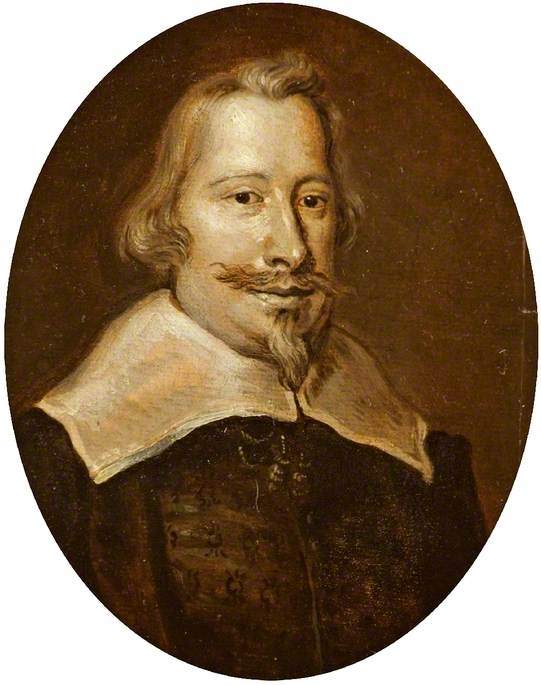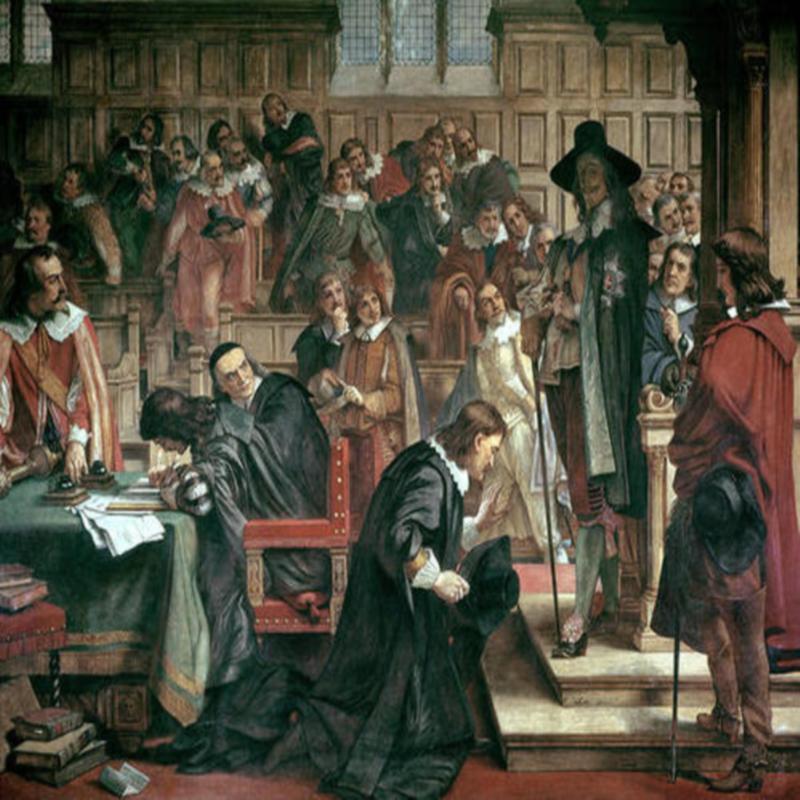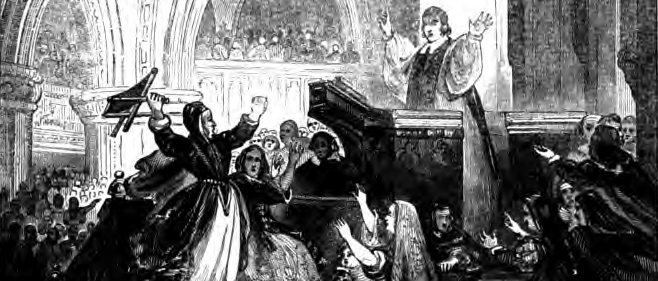The King's Dilemma
Posted on 21st September 2021
On 23 July 1637, a riot occurred when the Bishop of St Giles Cathedral in Edinburgh tried to read from the recently published New Book of Common Prayer. It had been introduced into Scotland by the Archbishop of Canterbury William Laud who had been instructed by King Charles I to bring uniformity of religious worship to his Kingdoms. The Scots viewed it as an attempt to impose an Anglican liturgy on a Presbyterian people and usurp their own Covenant with God. Their violent opposition to it was sealed with the signing of the National Covenant on the 28 February 1638.
Despite protestations of loyalty to the person of the King from those who opposed his religious reforms Charles was not willing to compromise over an event he viewed not as a protest but an act of rebellion and those he believed sought to undermine his authority. He was determined to crush them.
It soon became apparent however that he neither had the men nor the resources to do so. An attempt to impose his will ended in farce when a Scottish Army marched south defeated the English at the Battle of Newburn and occupied much of north-east England including Newcastle and its valuable coal supplies. Against his better judgement a humiliated Charles was forced to re-call Parliament.

King Charles had always had a fractious relationship with his Parliament dissolving it on three separate occasions early in his reign before dismissing it altogether in 1629 and ruling without it. Now he needed them to raise the money to if not equip an army capable of resisting the Scots then at least enough to pay them off.
The King was disenchanted to discover it was not the threat posed by Scottish aggression that preoccupied the Members of the House but the grievances that had been accrued during his eleven years of personal rule and that now under the leadership of John Pym, ably supported by others of mostly Puritan persuasion they sought to curtail the authority of a King who believed himself to be answerable only to God and not to the representatives of the people. Those who served him he soon found were vulnerable to Parliament’s ire. One of their first acts on 18 December 1640, was to impeach the man who had been responsible for his uncompromising imposition of the King’s religious reforms, William Laud, who was placed under arrest in the Tower of London.

In February 1641, Parliament under Pym’s guidance secured their own position by forcing the passage of the Triennial Act which guaranteed a Parliament be called at least once every three years.
On 22 March, Thomas Wentworth, the Earl of Strafford, the former Lord Deputy of Ireland and the King’s strongman who had insisted that he take a hard-line with his Parliament and had threatened to use an Irish army to restore order if necessary was arrested on charges of high treason. Pym could not provide the proof for such a heinous act so instead had him charged under a Bill of Attainder that required only a suspicion of guilt, but it also required the signature of the King. Charles informed Strafford that regardless of the verdict he would never sign it, but he needed the support of Parliament and had little choice. Despite his promises on 12 May, Strafford was executed. For a King who put personal loyalty above everything else it was a shameful act for which he never forgave himself and he believed that his own execution eight years later was God’s punishment for betraying a friend.
That same month Charles was forced to give royal assent to acts that prevented Parliament from being dissolved without its own consent and saw the Courts of Star Chamber and High Commission that dispensed the King’s justice abolished. A little later the Tonnage and Poundage Act forbade him from raising taxes of his own volition.
King Charles I, a ruler anointed by God, had seen his closest friends and advisers placed under arrest or executed and in a frenzy of legislation had seen his personal rule ended and his authority undermined at every turn, but things were soon to get even worse.
On 23 October 1641, the Catholic population of Ireland rose in revolt, they claimed in reaction to the execution of Strafford and in support of the King. The horror stories of massacres committed on Protestants in Ireland were circulating on the streets of London within days and they placed the blame for the atrocities, many of which were false or exaggerated, firmly at the door of the King.
Despite everything Charles still retained considerable support in the House of Lords and many of the votes in the Commons were marked by high levels of abstention. This led those such as Edward Hyde, the future Lord Clarendon, to believe that the King could still win politically, that many of the measures passed could be reversed in the fullness of time. He may have to temporarily at least, eat humble pie until the crisis had passed but the battle was far from lost. Others, prominent among them, his wife Henrietta Maria, demanded that he use force to impose his will and restore Royal authority.
In November, the House of Commons passed by just eleven votes the Grand Remonstrance, a long list of grievances going back to the very beginning of the King’s reign, and though it was careful to avoid blaming the King personally but rather his appointed Ministers the implication was obvious. Before it was even put before the King it had been published and distributed whipping London into a frenzy.
The Houses of Parliament in Westminster were now surrounded everyday by a baying mob and those entering the House of Lords or were known to be supporters of the King were subjected to a barrage of taunts, missiles, and even on occasion physical assault.
It was now being suggested that Pym and his supporters were determined to introduce a Militia Ordinance that would wrest control of the army from the King and place it under Parliament’s jurisdiction. Worse still rumours were spreading that moves were under way to impeach the King’s Catholic wife, Henrietta Maria.
Charles who had been raised to believe in the Divine Right of Kings never doubted his right to rule. He would consult with the representatives of the people in the form of Parliament if that was required but the final decision was his and his alone. His rule was just and in return he expected obedience. In these dark days the former was being eroded and the latter lost in a breakdown of deference of frightening proportions. He worried as to exactly what kind of Kingdom he would bequeath to his son and with the intense hatred being expressed towards his wife the passage of any Militia Bill would mean he could not even secure the safety of his family.
As the arguments intensified and the divisions became more stark and irreconcilable events began to spiral out of the King’s control. He could not even rely on those who may have been thought to be his natural supporters with magnates such as the Earl of Essex, Lord Manchester, Lord Saye and Sele and many of the county gentry firmly in Parliament’s camp.
Religious controversies abounded with the many dissenting sects, the Puritans, a vocal but also well-connected minority at their forefront, merely muddying the waters even further.
Charles was determined to maintain his position of absolutism as ordained by God, the Puritans were incapable of compromise as God’s chosen people, and John Pym and his supporters were just as determined to make all subject to Parliament.
London was a Puritan stronghold and so did the vehemence of the opposition to his rule and the animosity being levelled at the King and his family truly reflect the country at large? Some counselled caution others swift and decisive action.
On 4 January 1642, King Charles I descended upon the Houses of Parliament accompanied by 400 soldiers of his personal guard who immediately surrounded the building and sealed off all exits. He had on his person a warrant for the arrest of 5 Members, John Pym, John Hampden, Denzil Holles, Arthur Haselrig, and William Strode. Those in the Chamber of the House of Commons which was already in debate attempted to lock the doors against him, but the King’s soldiers forced them open.
Charles had been prompted to act by both his wife and his more militant advisors but unknown to him the targets of his warrant had been forewarned of his arrival by the Queen’s friend Lady Carlisle and had escaped down the River Thames in an open boat.
Upon entering the Chamber, the King politely requested of the Speaker the use of his chair which was duly granted. He then addressed the Members with all due courtesy apologising for the disruption of their proceedings before declaring his intention to arrest those named in the warrant. He then asked Speaker Lenthall to point the named Members out to him.

Kneeling before the King, Speaker Lenthall replied:
“May it please your majesty, I have neither eyes to see nor tongue to speak in this place but as this House is pleased to direct me whose servant I am; and I humbly beg your majesty’s pardon that I cannot give any other answer than this to what your majesty is pleased to demand of me.”
A clearly startled King hesitated for a moment before responding, “Tis no matter, I think my eyes are as good as another’s.” He gazed upon the benches before saying, “I see, all my birds are flown,” and rising from the Speaker’s chair the warrant still clutched in his hands stormed from the Chamber to shouts from the Members of Privilege! Privilege!
The King’s attempt to re-impose his will upon a fractious Parliament had turned into farce and the London mob was outraged. The anger on the streets intensified and even the Trained Militia Bands were parading in opposition to the Monarch.
A week later fearing for the safety of his family Charles left Westminster first to Hampton Court and then Windsor Castle before abandoning the city altogether. The next time he would see London it would be as a prisoner on trial for his life.
If you were the King, what would you have done and what would the consequences of your decision have been?
Tagged as: Monarchy, Tudor & Stuart
Share this post:





